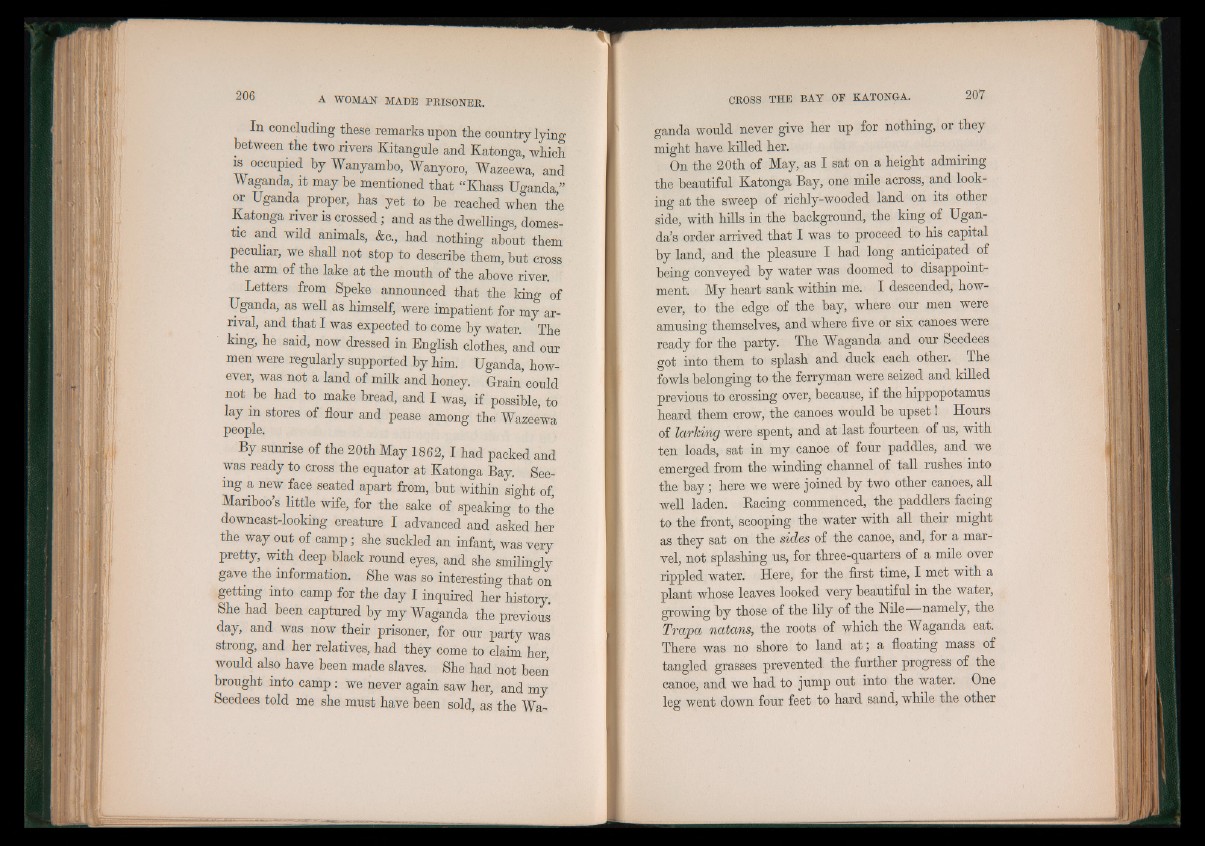
In concluding these remarks upon the country lying
between the two rivers Kitangule and Katonga, which
¿¡occupied by Wanyambo, Wanyoro, Wazeewa, and
Waganda, it may be mentioned that “Khass Uganda,”
or Uganda proper, has yet to be reached when the
Katonga river is crossed; and as the dwellings, domestic
and wild animals, &c., had nothing about them
peculiar, we shall not stop to describe them, but cross
the arm of the lake at the mouth of the above river.
Letters from Speke announced that the king 0f
Uganda, as well as himself, were impatient for my arrival,
and that I was expected to come by water. The
king, he said, now dressed in English clothes, and our
men were regularly supported by him. Uganda, however,
was not a land of milk and honey. Grain could
not be had to make bread, and I was, if possible, to
lay m stores of flour and pease among the Wazeewa
people.
By sunrise of the 20th May 1862, I had packed and
was ready to cross the equator at Katonga Bay. Seeing
a new face seated apart from, but within sight of,
Mariboo’s little wife, for the sake of speaking to the
downcast-looking creature I advanced and asked her
the way out of camp; she suckled an infant, was veiy
pretty, with deep black round eyes, and she smilingly
gave the information. She was so interesting that on
getting into camp for the day I inquired her history.
She had been captured by my Waganda the previous
day, and was now their prisoner, for our party was
strong, and her relatives, had they come to claim her,
would also have been made slaves. She had not been
brought into camp : we never again saw her, and my
Seedees told me she must have been sold, as the Waganda
would never give her up for nothing, or they
might have killed her.
On the 20th of May, as I sat on a height admiring
the beautiful Katonga Bay, one mile across, and looking
at the sweep of richly-wooded land on its other
side, with hills in the background, the king of Uganda’s
order arrived that I was to proceed to his capital
by land, and the pleasure I had long anticipated of
being conveyed by water was doomed to disappointment.
My heart sank within me. I descended, however,
to the edge of the bay, where our men were
amusing themselves, and where five or six canoes were
ready for the party. The Waganda and our Seedees
got into them to splash and duck each other. The
fowls belonging to the ferryman were seized and killed
previous to crossing over, because, if the hippopotamus
heard them crow, the canoes would be upset! Hours
of larking were spent, and at last fourteen of us, with
ten loads, sat in my canoe of four paddles, and we
emerged from the winding channel of tall rushes into
the bay g here we were joined by two other canoes, all
well laden. Racing commenced, the paddlers facing
to the front, scooping the water with all their might
as they sat on the sides of the canoe, and, for a marvel,
not splashing us, for three-quarters of a mile over
rippled water. Here, for the first time, I met with a
plant whose leaves looked very beautiful in the water,
growing by those of the lily of the Nile namely, the
Trapa natans, the roots of which the Waganda eat.
There was no shore to land a t; a floating mass of
tangled grasses prevented, the further progress of the
canoe, and we had to jump out into the water. One
leg went down four feet to hard sand, while the other